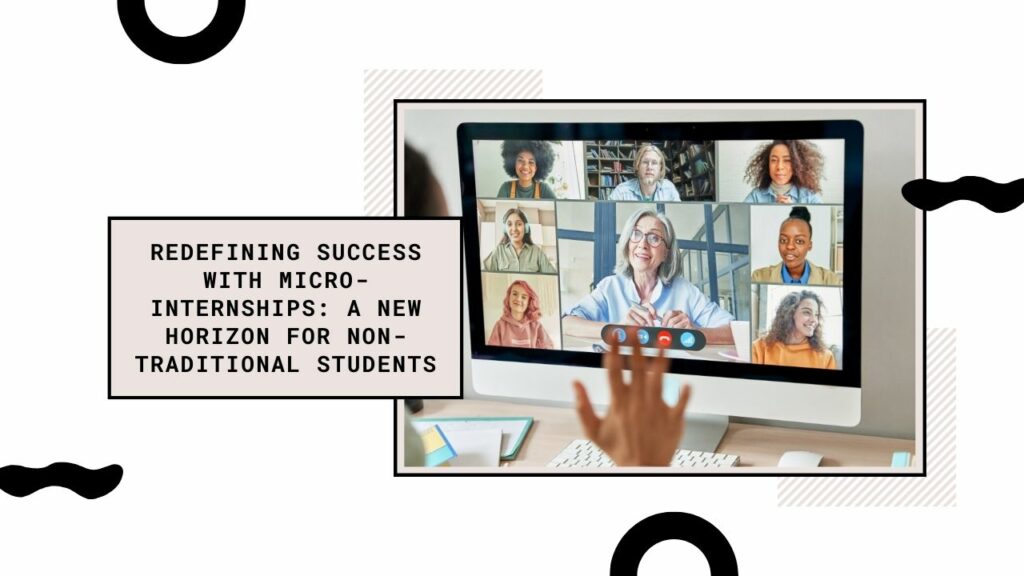
Are you a non-traditional student looking to further your education and career? Are you worried that traditional higher education programs may not fit into your busy schedule, meet your specific needs, and/or cost too much?
You’re not alone. Many adults face similar challenges when it comes to pursuing education and career opportunities. However, the landscape of education is changing, and there is a new horizon for non-traditional students: micro-internships.
With the rise of technology and innovative approaches to learning, online programs are providing flexible, accessible, and personalized options for adult learners.
And with the increasing demand for skilled workers in industries like CTE, these programs are becoming a game-changer for those seeking to advance their careers.
In this blog, we will explore how micro-internships are redefining success for non-traditional students and opening up new opportunities for growth and development. So get ready to be inspired, motivated, and empowered to take your education and career to the next level.
The Rise of Non-Traditional Students: Understanding the Shift
The educational landscape is undergoing a profound transformation, and at the heart of this evolution are non-traditional students.
These are the determined adults, the relentless lifelong learners, and the bold career shifters who are breaking the mold and redefining the path to academic and professional success. Gone are the days when the traditional four-year college experience was the sole gateway to a fulfilling career.
Today, the diversity in student demographics is astounding, with more people than ever seeking to enhance their skills and knowledge at various stages of life. This shift is not just a trend; it’s a revolution in how we perceive education and career development.
Non-traditional students are no longer outliers; they are pioneers, leading the charge towards a more inclusive, flexible, and practical approach to learning. This demographic shift is a clear signal to educational institutions and policymakers alike that the time for change is now.
It’s time to embrace the diversity of learners and provide them with the innovative tools and programs they need to thrive. As we delve deeper into this transformative era, let’s champion the cause of non-traditional students and acknowledge their pivotal role in shaping the future of education and the workforce.
Micro-Internships: The Bridge Between Learning and Doing
Micro-internships stand at the forefront of revolutionizing the way non-traditional students transition from academic learning to real-world application. These project-based, professional engagements offer a robust platform for learners to apply their theoretical knowledge in practical, real-world settings.
With opportunities that range from 10 to 40 hours of commitment, they can help accommodate the dynamic schedules of those juggling various life responsibilities. What sets Micro-internships apart is their year-round availability, offering both on-site and remote options to ensure utmost accessibility.
RW2 in partnership with Parker Dewey further amplifies this initiative, providing a seamless gateway for non-traditional students to embark on these flexible, professional, and paid work experiences.
Through this collaboration, students are empowered to not only demonstrate their competencies but also to explore diverse career paths and significantly broaden their professional networks. The essence of Micro-internships lies in their ability to blend learning with tangible doing, thereby offering a paid opportunity that fuels both professional growth and personal motivation.
It’s an innovative approach, enabling students to gain valuable experience, prove their mettle in their chosen fields, and make meaningful strides towards their future career goals.
Embrace the Future of Education
Embrace the future of education by diving into the world of CTE education with RW2, where innovation meets practicality. With specialized programs like Computer-Aided Drafting and Design (CADD), Revit for Building Information Modeling (BIM), and Cybersecurity, RW2 is at the forefront of providing cutting-edge skills and knowledge tailored to meet the demands of today’s tech-driven industries.
Starting on April 22, 2024, these programs are designed with the non-traditional student in mind. The CADD program is just 14 weeks, and the Revit for Building Information Modeling is just one week longer – 15 weeks, with classes two days per week with live instructors. This leaves ample room for independent study on non-class days.
For those intrigued by the complexities and critical nature of safeguarding digital assets, the Cybersecurity program is 24 weeks and prepares students to take the Security+ exam. There is live instruction for the three days of class each week with a focus on in-class work to maximize learning and application.
These meticulously structured programs ensure that even the busiest of students can find a pathway to success without compromising their life’s responsibilities.
Jumpstart your career, elevate your skills, and step confidently into the future with RW2’s forward-thinking education approach.



